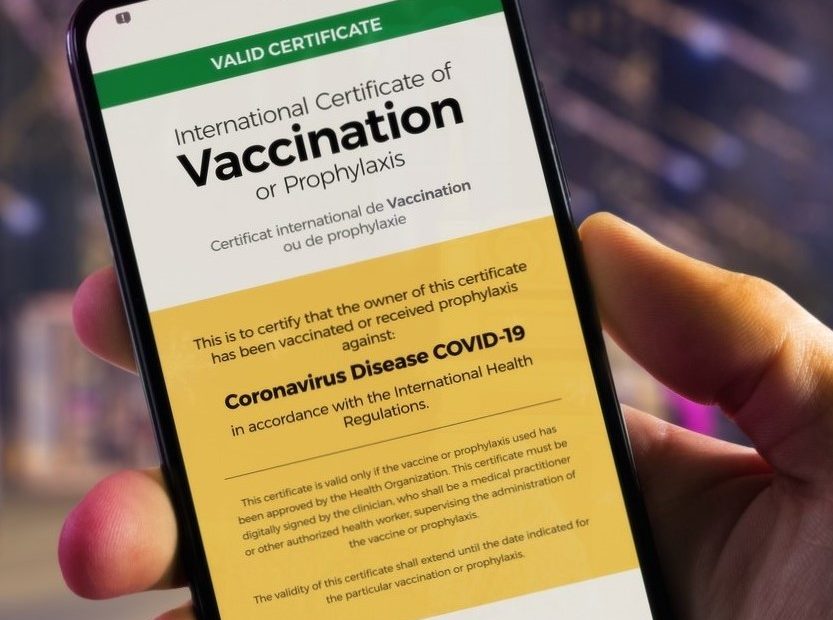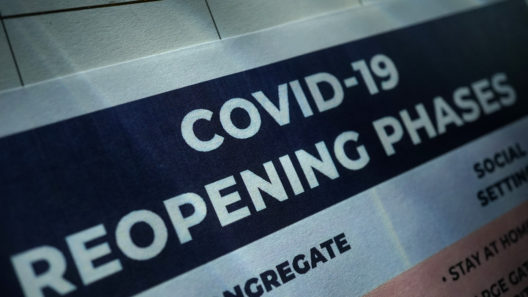Vaccine passports and COVID-19 status apps: launching an evidence review and expert deliberation
An evidence review and expert deliberation chaired by Professor Sir Jonathan Montgomery
12 January 2021
Reading time: 8 minutes

As the UK and other national governments begin to roll out mass vaccination programmes against COVID-19, a new and pressing challenge has arisen – how should the Government adopt vaccine passports and COVID-19 status apps, that could give citizens different rights and freedoms?
The Ada Lovelace Institute launches an evidence review, including a series of expert panels, an open call for evidence and a deliberative expert body, chaired by Professor Sir Jonathan Montgomery, which will establish recommendations and open questions about the practical and ethical issues around digital vaccine passports and health status apps.
- Professor Sir Jonathan Montgomery chairs an expert deliberation as part of a wider review of evidence on vaccine passports and COVID-19 status apps consisting of a series of interdisciplinary panels and an open call for evidence.
- Vaccine passports and COVID-19 status apps are the next emerging COVID-19 related technology in the UK and globally.
- The review is designed to provide guidance to the UK and other national governments, and a body of evidence to help ensure any potential roll-out of vaccine passports and health status apps work in the best interests of people and society.
The Institute’s review will convene cross-sector experts to explore the risks and benefits of private and public sector digital vaccine passport and health status app schemes, host a number of public events examining the international issues from a range of perspectives and is launching a call for evidence which will culminate in a report designed to provide guidance to the UK, and other national governments, on the potential roll-out of digital vaccine certification schemes and understand which red lines not to cross and where to focus regulatory attention.
This project will build upon rapid and rolling research by the Institute on the technical considerations and societal implications of COVID-19 related technologies, in particular, Exit through the App Store, which considered the use of technologies to transition from the first COVID-19 lockdown in April 2020.
During the course of the COVID-19 pandemic, there have been repeated suggestions for documentation that verifies some COVID-19 relevant attribute about a person, such as a test result or vaccination status, which would grant them privileges on that basis, e.g. exemption from quarantines and contact tracing self-isolation requests or greater access to social events and workplaces.
As a vaccine begins to be rolled out across the United Kingdom, and across the globe, there is a strong basis for contemplating the benefits and risks of vaccine passports and COVID-19 status apps.
There have been multiple reports the UK Government is considering some form of test and vaccine-based certification. The vaccine is the Government’s primary strategy for ending lockdown, so some means of identifying who has been vaccinated will be necessary. Although on 1 December 2020, Michael Gove stated that the Government was not planning to introduce vaccine passports, he left the door open to private providers.
As the Ada Lovelace Institute’s International monitor of vaccine certificates and COVID status apps shows, politicians and officials in Ireland, Singapore and Taiwan, among others, have also shown a renewed interest in the idea. The World Health Organisation is recruiting experts for vaccine certification and collaborating with Estonia to develop a Smart Vaccination Certificate consortium and private airline companies have begun to develop prototypes.
The Ada Lovelace Institute is particularly focused on considering proposals in which private health data is used in the public domain and digitally linked to an identified individual.
The evidence review will begin work in January 2021 with a call for evidence and a series of public events focused on the history of vaccine certifications, the technical design for digital certification regimes, and the ethical, health and legal challenges they may pose. Questions the review will seek to explore include, but are not limited to:
- Science – What is the current scientific understanding of how different vaccination regimes affect individuals’ relative risk of disease and transmission? How does this risk change over time after doses have been administered?
- History and uses – What is the history of vaccine certifications? How have they been used elsewhere? What are the possible public and private sector uses of these certifications today?
- Design – What technical design decisions can and should be made, including security, authentication, identity linkage, interoperability, data-sharing, input data?
- Law – How do existing laws and regulations apply to vaccine certifications and their potential use cases?
- Ethics – What are the ethical trade-offs involved in discriminating on the basis of vaccination status to grant differential freedoms?
- Social impact – What are the potential social impacts, including stigmatisation and discrimination; loneliness and economic scarring? Will these systems reinforce concentrations of power, within and between countries?
- Behaviour – What will be the behavioural impacts on e.g. vaccine uptake? How should communication about vaccination certification be framed?
Professor Sir Jonathan Montgomery, Professor of Health Care Law at University College London and Chair of Oxford University Hospitals NHSFT, said:
The case for a vaccine certification regime can be readily grasped. A regime in which there is clarity about risk an individual faces or poses should better enable individuals, families, public services, companies and employers to manage that risk better, striking a more equitable balance between universal restrictions and individual liberty and at a macro level improving societal and economic outcomes.
However, it is unclear whether the scientific data are sufficiently clear or reliable to be used in this way. We do not yet know whether the COVID-19 vaccines will prevent people spreading the virus as well as reducing the risk that they become seriously ill. Evidence on the duration of the immunity conferred is currently limited. These uncertainties make the significance of holding a certificate problematic.
The pandemic is creating the conditions for, and accelerating, individualised risk scoring, which may be used in future to shape national societies and determine global movement. An infrastructure of digitally facilitated personal risk profiling might emerge that, once established, may become a permanent part of our social and global fabric. This generates two big direct risks from a certification regime.
The first is undesirable consequences associated with the sharing of private health data with multiple unconnected and unregulated parties on an individuals’ employability, insurability, social status and other important aspects of social participation. Second, segregating or limiting rights and freedoms on the basis of health status can exacerbate inequalities and compound the already disproportionate effect of COVID-19 on marginalised communities.
These risks may not be insurmountable, but it is unquestionable that careful thought is needed, alongside policy instruments to mitigate inequalities like new laws or guidance, the right technical format, among other protections, which is why I am pleased to be chairing the expert panel as part of this vital work led by the Ada Lovelace Institute.
Carly Kind, Director, Ada Lovelace Institute, said:
Regardless of whether the UK Government chooses to issue some form of vaccine certification, sanctions private companies to do so, or bans discrimination on the basis of certification altogether, individuals will use and act on the certification of these results in informal settings such as gathering with friends or dating.
Therefore there is urgent need for guidance from the UK Government on how these apps should be used and the relative risks individuals actually face as a result of their introduction. This requires evidence – quantitative and qualitative research on public understanding of different framing and phrasing – to determine how to best communicate the true nature of each kind of certification.
I am pleased that the Ada Lovelace Institute, with Professor Sir Jonathan Montgomery and an interdisciplinary group of experts from public health, law, sociology, epidemiology and other domains, is leading this work, which will provide a vital body of evidence to help society understand how these systems should be used.
ENDS
Contact: Hannah Kitcher on 07969 209652 or hkitcher@adalovelaceinstitute.org
Notes
- The Ada Lovelace Institute (Ada) is an independent research institute and deliberative body with a mission to ensure data and AI work for people and society. It aims to: build evidence and foster rigorous research and debate on how data and AI affect people and society; convene diverse voices to create a shared understanding of the ethical issues arising from data and AI; and define and inform good practice in the design and deployment of data and AI.
- Ada has been running rapid and rolling research and discussion events throughout the COVID-19 pandemic and in April 2020 published a rapid evidence review of the technical considerations and societal implications of using technology – including digital contact tracing, symptom tracking apps and immunity certification.
- Ada is funded by the Nuffield Foundation, an independent charitable trust with a mission to advance social well-being. It was established in early 2018, in collaboration with the Alan Turing Institute, the Royal Society, the British Academy, the Royal Statistical Society, the Wellcome Trust, Luminate, techUK and the Nuffield Council on Bioethics. Find out more: Adalovelaceinstitute.org | @adalovelaceinst
- Jonathan Montgomery is Professor of Health Care Law at University College London and Chair of Oxford University Hospitals NHSFT. He was Chair of the Human Genetics Commission 2009-12, the Nuffield Council on Bioethics 2012-17, and Health Research Authority 2012-19. He was knighted for services to bioethics and healthcare law in the 2019 New Years Honours. His research focuses on health care law and the governance of bioethical issues. In addition to academic publications he has been involved in developing guidance for health professionals and policymakers. This has included work on confidentiality for the General Medical Council and co-authoring a chapter on ‘ethics and the social contract for genomics in the NHS’ in the Chief Medical Officer for England’s report for 2017. During 2020, he chaired the Ethics Advisory Board for NHSx on its contact tracing app.
Related content

What place should COVID-19 vaccine passports have in society?
Findings from a rapid expert deliberation to consider the risks and benefits of the potential roll-out of digital vaccine passports

The epidemiological and economic impact of vaccine passports and COVID status apps
The second in a series of public evidence events on vaccine passports and COVID status apps.

The history and uses of vaccine passports and COVID status apps
The first in a series of public evidence events on vaccine passports and COVID status apps.

Vaccine passports and COVID status apps: call for public evidence
An open call for evidence from public health officials, civil society organisations, researchers and citizens